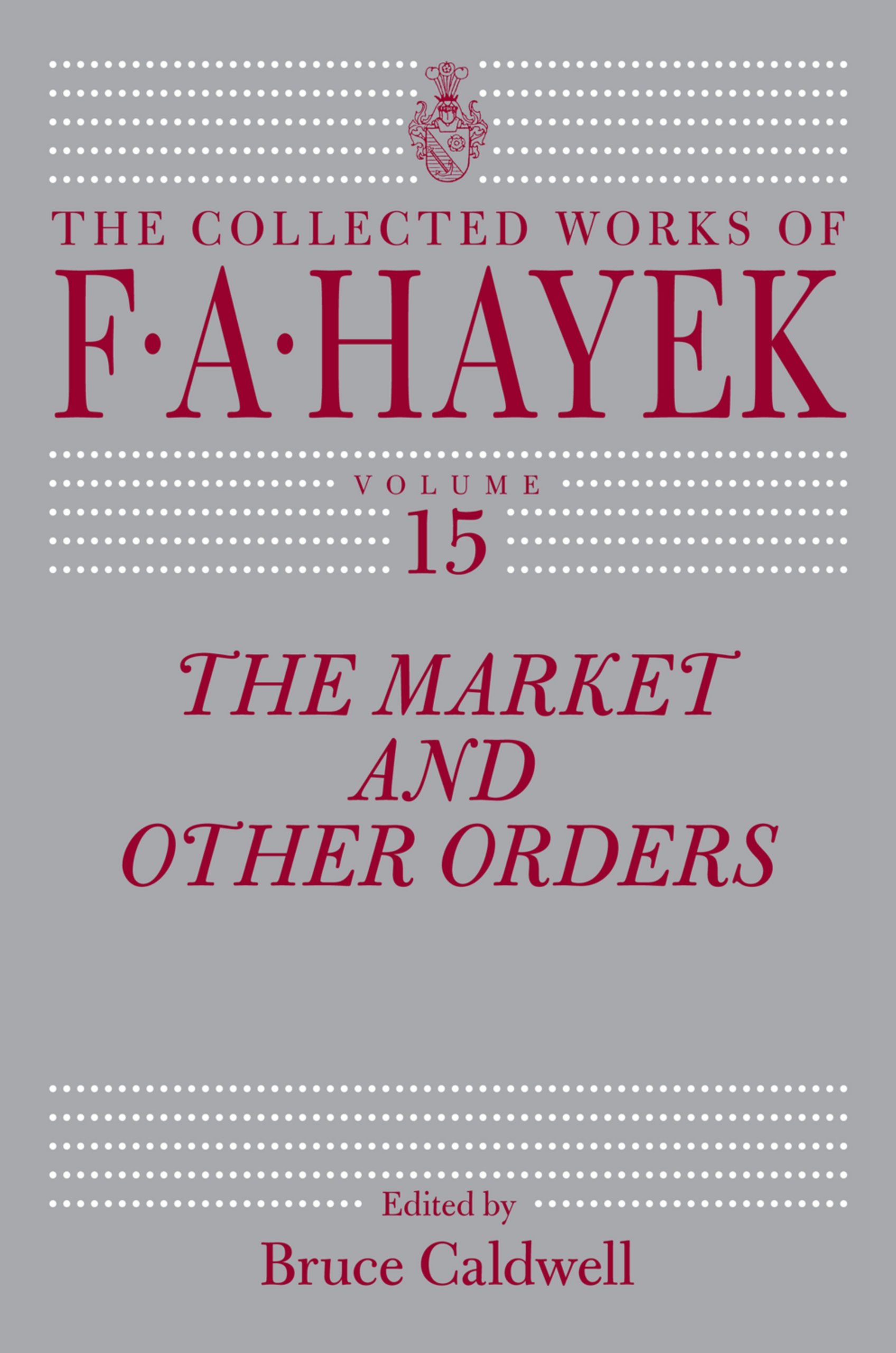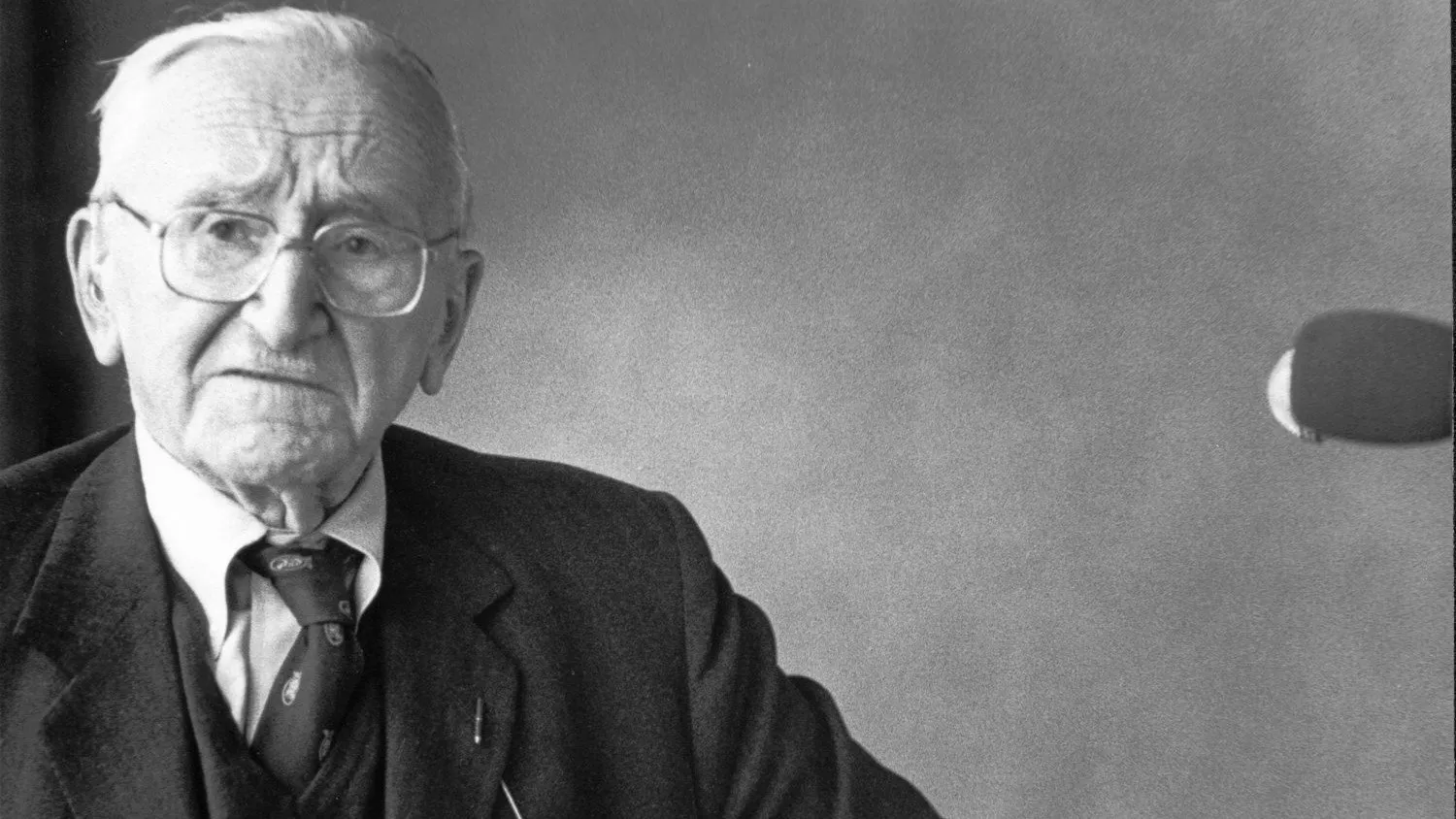The Market & Other Orders
by F.A. Hayek, edited by Bruce Caldwell
University of Chicago Press, 2014, 472 pages
 Friedrich August von Hayek was the greatest and one of the most under-rated classical liberal philosopher(s) of the twentieth century. He won the economics Nobel in 1974 ― yet it is fair to say that his contribution to economic theory is largely ignored by academic economists. Fellow economics laureate James Buchanan, for example, argues that Hayek's greatest contributions are his 1944 opus The Road to Serfdom and establishing the Mont Pelerin Society.
Friedrich August von Hayek was the greatest and one of the most under-rated classical liberal philosopher(s) of the twentieth century. He won the economics Nobel in 1974 ― yet it is fair to say that his contribution to economic theory is largely ignored by academic economists. Fellow economics laureate James Buchanan, for example, argues that Hayek's greatest contributions are his 1944 opus The Road to Serfdom and establishing the Mont Pelerin Society.
Hayek's greatest economic contribution was in information economics. That contribution has been collected and republished in volume 15 of his Collected Works under the title The market and other orders edited by Bruce Caldwell and published by the University of Chicago Press.
He made what many non-economists might consider a trivial methodological point. Decision makers often never have the information that economists ascribe to them. The "perfect information" assumption that underpins much of neoclassical economics is nonsense. Or, as Hayek said, the economic problem society faces isn't making "the best use of the available means", but rather, how best to utilise the knowledge we have, given that it is highly dispersed across individuals and time. This observation, now known as the knowledge problem, contained in his famous 1945 essay, The use of knowledge in society, is his most important economic insight.
There are profound implications that flow from that point. Grandiose plans that rely on large amounts of information will fail. Decision makers should be humble and modest in their ambitions. More importantly, the price mechanism operates to coordinate and allocate resources, including dispersed information, better than bureaucrats ever can. This can be summed up in the observation that human action trumps human design.
Despite all that, Hayek was not an anarchist. He imagined a large role for the state in enforcing contracts, setting standards and maintaining the rule of law.
Non-economists might be tempted to dismiss all this as simply being common sense. The sad reality, however, is that economists continue to build models by simply assuming that the knowledge necessary to operationalise them exists, and governments continue to conduct their affairs as if they did actually have that knowledge.
While academic economists conduct their affairs in some ignorance of Hayek, it seems that the real world has not. In 2006 then ALP leader Kevin Rudd launched a blistering attack on Hayek claiming that Hayek had founded an "intellectual sect" that had become "public policy orthodoxy" following the Thatcher and Reagan revolutions. It is quite clear that even if Rudd had read Hayek's work he certainly hadn't understood it.
 In 2009 then prime minister Kevin Rudd had another go at Hayek; blaming him for the intellectual climate that had led to the Global Financial Crisis. The events of that year, in Rudd's mind, represented the triumph of Keynes over Hayek. But that was always bluff and bluster to cover over the problems within his own government. Indeed the very problems that Hayek would have predicted ― one man simply could not micromanage the entire government.
In 2009 then prime minister Kevin Rudd had another go at Hayek; blaming him for the intellectual climate that had led to the Global Financial Crisis. The events of that year, in Rudd's mind, represented the triumph of Keynes over Hayek. But that was always bluff and bluster to cover over the problems within his own government. Indeed the very problems that Hayek would have predicted ― one man simply could not micromanage the entire government.
I have some mixed feeling about this book. On the positive side it contains in one place many of Hayek's important works relating to the knowledge problem and his defence of the market economy. Yet it doesn't contain his work on the socialist calculation debate ― the most important manifestation of the knowledge problem.
It does contain his previously unpublished 1961 lectures to the University of Virginia. These four lectures will be of great interest to Hayekians as they symbolise the end of Hayek's career as an economic theorist as opposed to philosopher and applied economist.
Hayek had been known as a theorist prior to the war and the Keynesian revolution and had wanted to return to the field. Yet in giving those lectures he came to the view that he had no additional insights to offer. It is clear from Buchanan's recollection of those events that he too was of a similar view. It is an open question as to why Hayek never published these lectures in his lifetime. However, what is most disappointing is that the editor has reproduced Hayek's hand drawn diagrams and didn't think to have them professionally redrawn. It is one thing to be true to original, but we know that the editor has silently corrected typos and minor errors throughout Hayek's writing ― he tells us so, in the introduction. A minor quibble in what is otherwise a magnificent collection of Hayek's writing.
The essays in this volume are largely drawn from three of Hayek's collections, his 1949 Individualism and economic order, his 1967 Studies in philosophy, politics, and economics, and his 1978 New studies in philosophy, politics, economics, and the history of ideas. Their appearance in this volume indicates that these three collections will not themselves be reproduced as part of the Collected Works. All of the essays will no doubt appear as part of the collection, but they will do so in a manner that the series editor and individual book editors choose. There is value in reading the essays as part of the collections, and in the order that Hayek chose. That is lost.
Hayekian purists are likely to be disappointed with the Collected Works as a series. The series has been slowly dribbling out for over 25 years and is still incomplete. The now definitive The Road to Serfdom and the definitive The Constitution of Liberty are magnificent volumes ― yet it isn't clear why it has taken so long to publish the entire series. I suspect that part of the problem is that there is no "Hayekian sect" to demand the process be sped up. Then there is the fact that his most well-known books have never been out of print.
Frustrations surrounding the management of Hayek's Collected Works shouldn't detract from this particular volume. For readers new to Hayek's work on information and knowledge it contains his important work, and a comprehensive introductory essay. It is well edited with Hayek's errors corrected or noted and references checked. It brings some of Hayek's finest work back into print.
No comments:
Post a Comment